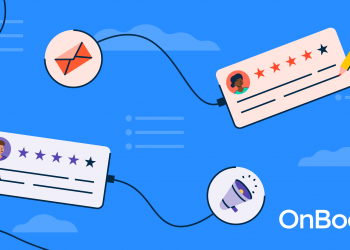How to Create Effective Lead Magnets that Boost Conversions (17 Lead Magnet Examples) – crowdspring Blog
Getting people to your business website is nice, but it has little value if they don’t convert. So if you’re looking to turn website visitors into paying customers, you must have an irresistible lead magnet.
What is a lead magnet?
A lead magnet is a free item or service you offer website visitors in exchange for their email addresses or other contact information. Examples of lead magnets include trial subscriptions, free consultations, white papers, and samples.
The goal of a lead magnet is to convert website visitors into leads, which you can then nurture into customers.
Lead magnets can help you attract new leads without spending much on advertising.
Why do you need a lead magnet?
Consumers are becoming more hesitant than ever to share their personal information. To address this, you need to give consumers a compelling incentive to share their names and email addresses.
The usual CTA (call to action) button of “Click here to sign up for our newsletter” is not enough to persuade prospective leads to volunteer their contact information.
However, inviting customers to sign up for your newsletter for a discount on their next purchase is a much more attractive incentive.
In that way, not only can you earn a sales lead, but you will also earn a conversion because now, the customer is more likely to purchase using their new discount code. That’s the power of an effective lead magnet at play.
What are the benefits of lead magnets?
Statistics show that 95% of visitors will not buy on their first visit to your site.
Moreover, 70% of first-time retail customers won’t return for a second visit.
Lead magnets help you catch visitors in the early research stage of the customer lifecycle and then nurture the engagement to increase the odds of a conversion.
Lead magnets:
- Establish the business’s legitimacy in a particular area of expertise,
- Create a foundation for developing trust and allowing you to nurture a potential client relationship,
- Reinforce to your customers your company’s genuine concern in addressing their needs rather than just pushing and selling, and
- Are the most effective way to automate your lead generation process & expand your email list.
What makes a good lead magnet?
There are a few key things that make a lead magnet effective:
1. It is relevant to your target audience
You can’t just make up a random lead magnet and expect people to care.
The lead magnet should be relevant to the needs of your target audience.
Your lead magnet must solve a problem – a genuine problem that you can support with customer data and not one your marketing team assumes your clients might have.
Take the time to discover your target audience and start leading them down the road to solving them.
List your target customers’ top concerns and study their online behavior.
You can even ask your customer service or sales team to keep tabs on the most frequently asked questions or which customer concerns are recurring. Ask these questions:
- What do your target customers need help with most often?
- Are there other products/services competing against yours?
- How does my content fit into all of these things?
Then, pass the insights to the marketing team to add to their marketing strategy.
Want a free brand review?
Answer 5 short questions and we will send a custom report with actionable insights and specific actions you can take to build a stronger brand.
We just emailed the info to you.
2. A good lead magnet is simple and easily understood
While it’s tempting to use your most recent document, case study, or ebook as a lead magnet, the best lead magnets are easily digestible, even for someone with an entry-level understanding of your product or service.
People have short attention spans, so make sure your lead magnets are short and sweet. Stay away from using too much industry jargon.
Consider skipping the traditional ebook/white paper format. Although they’re rich in information and detailed insights, both formats are typically long-form and need significant time investment from the reader. This might be off-putting for your audience, especially those who need compact and immediately actionable information.
Instead, you might want to consider condensing long-form content into still informative but bite-sized formats such as:
- Infographic – breaks down data and stats into easily understandable icons, graphics, and images.
- Video – helps in the easy digestion and retention of complex information.
- Checklists – simplifies a process through an instructional or step-by-step format.
3. A good lead magnet is delivered in real-time
It’s critical to guarantee that your material is delivered as quickly as possible.
For a lead magnet to be effective, your customers should be able to get the content as soon as they hit the download button.
If this isn’t possible or a good fit for your overall strategy, the next best alternative is to send a follow-up email immediately with the lead magnet they requested.
But note that the slightest friction can cause you to lose some leads. So weigh your options very carefully in this regard.
Ultimately, don’t make leads wait. They’re expecting the material you promised, and they want it fast. Don’t let them down.
4. A good lead magnet highlights your expertise
Stick to what you already know best. You want to ensure that your lead magnet highlights your authority on the subject.
While writing about a topic outside your scope of expertise isn’t off-limits, it is still strategic to leverage your industry knowledge.
The information and insights you provide draw your target audience in and cement your reputation as the authority in your industry.
5. A good lead magnet provides at least one actionable step
Make sure lead magnets have a single easy, actionable step – something that rewards them with an easy win. Give your leads something they can pull away and use as soon as they read it.
This could be a checklist, a hack, or a tip – something that inspires the reader to take action. All it takes is that one win to make the customer feel like they got value from your lead magnet.
6. A good lead magnet is of practical use to your target audience
People don’t just want to consume information; they also want to engage with it and apply it to their lives.
Give them material that they can interact with and put into practice immediately, such as:
Quizzes and assessments
These easily digestible contents provide high-value and customized insights that help potential leads discover more about themselves, their company, or their clients.
Here’s a good example we sometimes use to help people understand why logo design is important. Go ahead and try this quiz – it’s tough to get all five questions right:
WHICH LOGO IS BEST?
Interactive content engages users from the start and keeps their attention long enough to get target customers interested in your product or service.
Quizzes are also shareable and entertaining. When done correctly, quizzes can even be highly educational. They command attention and demand that readers engage with the questions before them rather than just scrolling through a blog post or eBook.
Free trials
Getting something for free or at a reduced price is the most advantageous form of content. Make sure you utilize this lead magnet right before a customer is supposed to be making a purchase choice.
Free tools
Free tools are effective lead magnets because they offer a practical solution that can be used immediately.
They also have the added benefit of being easily shareable, especially when they provide real solutions to a significant need in your customer base.
One such example is Brand Studio. It’s a free tool that generates customizable and branded templates in a minute or less.
The tool is primarily aimed at helping small businesses and start-ups save time and cost when making branded marketing materials. That way, founders and business owners can allot their energy and budget to more pressing matters related to starting a business.
Utility is key. Give people something helpful, reusable, and worth passing along.
7. A good lead magnet is evergreen
When creating lead magnets, make sure that they are evergreen.
Evergreen content topics are not time-sensitive. This means that the lead magnet will remain relevant and valuable for a long time instead of going out of date as soon as new information is released.
The lead magnet should provide value to your audience and continue to do so in the future.
This way, you can continue to generate leads from the same lead magnet long after it’s published.
Here are some ways to make your lead magnet evergreen:
- Do keyword research to find topics with high search volume but low competition. These are the topics that people want to know more about, but there aren’t a lot of resources on them.
- Keep a pulse on industry news and developments. Make sure you are up to date with sweeping changes in the industry.
- However, stay away from seasonal trends. Go for typically timeless tips, strategies, or processes that can be used regardless of the current trends.
- If your industry must include time-based information, regularly update your content. This is especially true if your topic falls around volatile industries with changing standards and algorithms.
Nine steps to creating an effective lead magnet
A lead magnet is essential to convert website visitors into paying customers. But how can you create one that is irresistible to your target audience?
Follow these nine steps to creating a lead magnet that boosts your conversions:
1. Define your goal
Before creating your lead magnet, it is essential to define your goal. Ask:
- What do you want your lead magnet to achieve?
- Do you want to increase newsletter sign-ups?
- Drive more traffic to your website?
- How would you get more people to download your app?
Once you have a clear goal, you can start creating a roadmap around it.
Your lead magnet should target a specific audience with a particular problem that your product or service can help solve. Without this focus, your lead magnet will likely fall flat.
2. Know your target audience
Marketers’ most common mistake with lead magnets is assuming they need to attract many people. You should go the opposite route.
Remember that your lead magnet must be tailored specifically for the people you want it to attract.
When you have a clear idea of the sort of individual you want to attract, your marketing becomes a lot simpler.
To help you define your buyer personas, ask the following questions:
- What are their demographics (age, gender, location, education, income, family size)?
- What are the common problems and pain points that they face?
- What can you do to help solve these pain points for them?
Many businesses may have numerous buyer personas, but each magnet should be designed to appeal to one of them.
Don’t worry about picking the best buyer persona to start with. Eventually, you’ll need lead magnets for all of them. Instead, choose the audience segment that can benefit the most now.
3. Identify your value proposition
Once you’ve decided which prospects to pursue, you need to give them a compelling incentive to engage your lead magnet.
There are millions of lead magnets, so offering something unique and valuable that people cannot find elsewhere is essential.
This could be early access to a product or service, a special discount, or exclusive content.
In this instance, bigger isn’t always better. Don’t rely on a massive ebook or a long email course. The sooner you can provide them with results, the better.
4. Choose the lead magnet that fits your business type
There are many different formats you can choose for your lead magnets. There are quizzes, guides, reports, infographics, templates, videos, checklists, and more.
The format you choose will depend on your goals, your target audience, and your business.
For example, an ebook would be a good choice for a lead magnet that is aimed at providing educational content. An infographic will be better if you want to communicate data or statistics visually.
5. Choose the right name for your lead magnet
Now that you know what you’re giving and to whom, it’s time to name your lead magnet.
And just like how it is with headlines for a marketing email or blog post, the title of your lead magnet will significantly impact its conversion rate.
Here are some quick guidelines to help with the naming of your lead magnet:
- Make it simple. When people see the title of your lead magnet, they should immediately get what it’s about. Clear and direct-to-the-point titles tend to perform better than fancy ones, especially if you’re new and only a few people know about your brand.
- Keep it simple. You should be able to say the name of your lead magnet in one go. If your lead magnet name is difficult to remember, people will quickly forget it.
- Make it stick. If you want to go the extra mile, make your lead magnet’s name as memorable as possible. This means that people only need to hear your lead magnet’s name once to remember it. You can try using puns or rhyming words, for example.
6. Don’t forget the lead capture form
A lead capture form is a form that website visitors can fill out before they move along in a sales funnel.
The visitor is typically asked for their email or other applicable contact details in exchange for access to a resource or a discount.
There are many different types of lead capture forms, but they all have one goal: to collect information from potential customers so that you can follow up with them and close the sale.
When designing a lead capture form, keep conversion rates in mind. The goal is to make the form as easy to complete as possible while still collecting all necessary information.
You can also include custom fields specific to your business or industry.
7. Create great, shareable, and usable content
Your lead magnet must be genuinely valuable to your target customers.
If your prospects can’t find any value in your lead magnet, they won’t bother spending time on it and even less with your brand.
Keep the following points in mind:
- Don’t give outdated information sources.
- Deliver on the promise as advertised in your lead-gen form
- Offer only highly relevant content tailor-fit to your targeted customer persona
Your lead magnet should be concise and to the point. No one wants to read a novel, so ensure you get your message across in as few words as possible.
Remember, you can always include links to additional resources if people want more information.
Your lead magnet must also stand out from the crowd and grab attention. Use eye-catching visuals with color psychology and the principles of good design to make them engaging from the get-go.
8. Promote your lead magnet
Once you have created your lead magnet, it is time to start promoting it.
Use social media, email marketing, and other channels to get the word out and drive people to your lead magnet. Similarly, you can opt to strategically put pop-up pages within the highest-traffic pages of your website.
And don’t forget to include a call-to-action (CTA) on your website and in your emails to lead prospects through the next funnel step.
9. Test, measure, and improve
A/B testing is crucial in determining whether a lead magnet is effective for you or not.
Even when a lead magnet drives a large number of leads to you, you can’t be sure that’s all there is and put all your eggs in one basket.
Try the following A/B testing strategies:
- In-content lead magnet testing: A/B test pop-up lead magnets vs. sidebar lead magnets
- Compare a sneak peek of the lead magnet (i.e., select pages or excerpts) versus an image-only lead magnet to see which is better at turning leads into conversions.
- Test whether a lead magnet set/package is better than a standalone content resource.
By testing different lead magnets and measuring their conversion rates, you can ensure that you’re always using the most effective lead magnet possible.
Additionally, by constantly improving your lead magnet, you can keep your conversion rates high and continue to grow your business.
Common types of lead magnets you can offer
Toolkits
A toolkit or resource list is a set of templates, checklists, ebooks, and the like that help provide all the essential hands-on resources on a specific topic.
Toolkits offer the convenience of a one-stop shop for information. Target consumers may reuse it repeatedly without searching for the tools or resources.
A truly valuable toolkit should include comparisons of alternative options and information about why a particular tool is necessary.
A toolkit can also be an excellent opportunity to promote your product if you provide a tool or resource.
How-to guides
Guides and tips are created to provide actionable and practical solutions to your target customer’s pain points. That being said, they should be easy to follow and understand.
You can do this with a step-by-step guide that breaks down complex processes into bite-sized points.
Avoid writing about your products or services. Visitors may see this as blatant self-promotion or that you are sugar-coating information just to land a sale.
Instead, write a guide that will generate interest in the more general sense of your brand. Try not to link your guide or tips directly to reference the benefits your products or services could provide prospective customers.
Ebooks
The ebook is a trendy lead magnet idea. This is mostly because they are relatively easy to produce from your collection of blog articles. You can take one of your most popular blog articles about your business or the core service you provide and then tweak the format to include an introduction, a glossary (if applicable), and a conclusion.
As an example, we’ve regularly done this with our content. We wrote Stand Out: An Entrepreneur’s Guide to Starting, Growing, and Managing a Successful Business to help aspiring entrepreneurs and business owners start and grow their businesses.
One advantage of offering a free ebook is that your potential leads can save and read it at a more convenient time. The downside is that your leads may end up falling out of the funnel because they’re not using the ebook immediately.
Remember, the faster a visitor uses a lead magnet, the better the odds of a conversion.
One adjustment you can make is keeping your ebook short but information-dense to provide value to the reader.
Resource library
Consider a resource library if you’re looking for an easy-to-execute lead magnet that will help boost your conversions.
A resource library is a collection of helpful resources that your target audience can use. This could include ebooks, white papers, checklists, templates, etc. One good example is the crowdspring small business resource library.
This is one of the most popular lead magnets because you provide a single access point to potential consumers. With this strategy, you can compile a variety of lead magnets in one spot.
Assessment tests or quizzes
Tests are successful because people are naturally drawn to learn more about themselves and their surroundings. That is why a type of self-assessment could be an attractive lead magnet for your website.
Most tests require completing a sign-up form at the end of the quiz so prospective leads can receive the results via email.
People typically enjoy quizzes that validate their skills or knowledge. For example:
WHICH NAME IS BEST?
Personality quizzes are viral because people love hearing about their best features and traits.
And although a quiz may have nothing to do directly with your business, you will have made contact with a prospective customer. You can then use this opening to nurture your new leads and discover more about their needs.
Quizzes are one of the more engaging and creative lead magnet ideas because they require interaction with the target audience. Moreover, they can likewise be used to gather helpful info for your customer persona.
Immediately after completing the quiz, ask the prospect for their email address so you can send them their results or conclusions. This will help increase your subscribers list and, eventually, your chances for conversion.
Cheatsheets and infographics
It is straightforward to create a cheat sheet. They are succinct, general summaries of critical information that may help you with your daily activities. That and who doesn’t love a life hack?
Handouts and cheat sheets are ideal for generating leads because they offer highly-tactical information that saves prospects a lot of time.
And although they’re frequently offered in PDF format, cheat sheets are more versatile than reports or guides.
Cheat sheets are usually only one or two pages long and are very direct. These are sometimes referred to as checklists, blueprints, and mind maps.
Here are a few tips to keep in mind when creating your cheat sheet:
- It should streamline a procedure that contains repetitive steps.
- The cheat sheet should simplify complex processes to be used repeatedly.
- When appropriate, use images or mind maps to show the steps involved.
- You can also use fill-in-the-blank style templates or content whenever possible.
Infographics, on the other hand, are a quick and impactful way to highlight important information.
Statistics can seem a bit drab. That’s where an infographic helps present the data in a striking and more shareable format.
As a lead magnet, you can offer one part of the infographic to get your leads’ attention. The rest will only be made available to them once they opt in.
Downloadable PDF versions
“Download to PDF” is heavily underrated as a lead magnet.
Offering a PDF version of your most popular content is very low cost.
You may simply convert your blog articles into PDFs and offer them an online version of your material.
PDF versions of your blogs are something your readers can always take away. Plus, it’s something they can take with them immediately.
You can optimize this lead magnet by including an email opt-in before they download the material. Strategically, you also capture your leads at the beginning of the customer journey.
If you run a blog, you could encourage your prospects to save your posts through a downloadable PDF version so they can return to them later.
Short training courses
Short courses are essentially similar to webinars, but the main difference is that they can be delivered in various formats.
The main advantage of a short course is that you don’t need to start from scratch or spend the material, time, and energy capital that goes into live webinars.
You can instead use existing content and repurpose these into bite-sized installments.
You could present a short course through an email series, a slide deck, or short video installments.
Short courses are great as lead magnets because they work alternatively as a lead nurturing tool.
Free shipping
Free delivery is a popular incentive for customers. According to research, customers are more inclined to buy something for $5 with free shipping than to pay $2.50 for goods and a $2.50 shipping charge. So examine how this lead magnet may work with your target audience if you plan to run an online store.
Customers adore discounts and receiving things for free. Giving away email addresses is often a small price to pay for many individuals if they may potentially save a couple of dollars on a purchase by doing so.
Coupons and discount codes
It may be the oldest lead magnet in the world, but the coupon has also gotten a modern rework thanks to the popularity of social media. Paper coupons are being phased out in favor of electronic ones on social media and marketplace platforms.
Coupons and discounts work best for companies that offer tangible products or anything for which customers may make multiple repeat purchases.
Giving coupons as a lead magnet is a fantastic way to encourage people to join your email list. These lead magnets provide a discount code or voucher that can be used at checkout to reduce the amount paid for the service.
Discounts entice consumers unfamiliar with your company to at least sample your items since they don’t have to pay full price. A discount will encourage visitors to buy, resulting in higher conversion rates and sales.
A coupon or discount lead magnet is a fantastic method to collect sales-ready leads since it allows visitors to go from learning about your offer to purchasing in just a few clicks.
Software download or free product trial
Users are frequently enticed to try a new software product by offering a free trial. You may accomplish the same thing by providing a short glimpse of whatever course content, depending on the prospect’s interest.
A free trial lead magnet can work well because people love to try it before buying.
You can lead with a limited-time offer for a free product trial with all the premium features. After this period, the customer may continue with a paid pro subscription or downgrade to a freemium plan.
Pro-tip: A “No credit card required” guarantee is an incredibly efficient way of lowering the barrier to entry. Visitors no longer need to worry about canceling their free trial period to avoid getting charged.
Free online tools, calculators, and generators
An online tool is free on your site and requires a login. In exchange for providing their email address, users will be given access to a tool that they can use to test, learn, and improve an aspect of their product.
Providing free tools is an effective way to get people’s contact information. People will provide their email addresses in exchange for valuable tools that solve problems or simplify their work.
You get their email addresses, and they receive a free tool they can use all the time.
Remember, you’re beginning a crucial connection when developing a lead magnet. It’s essential to start the process of establishing trust. When your visitors believe that you have their best interests at heart, they’ll start buying from you.
Explore your options for choosing the lead magnets for your business. Change up the different types and keep track of and watch your outcomes. Some may work better in specific niches than others. Test, measure, re-test, and evaluate as needed.
Source by www.crowdspring.com










